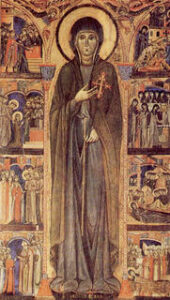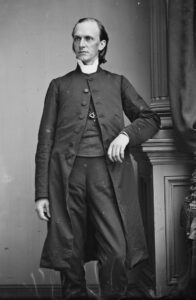Welcome to the final matchup of the Saintly Sixteen, as Clare of Assisi takes on Henry Whipple. With seven tickets punched for the Elate Eight, Clare and Henry are competing for the last available spot.
On Friday, Julian of Norwich trounced Zita 82% to 18%. She'll face Joseph of Arimathea in the next round.
Vote now!
Clare of Assisi
 Let's look at letters Clare wrote to Agnes of Prague, a princess who dedicated her life to God. Agnes built a hospital and friary for Franciscans, from whom she learned about Clare and the Poor Clares. Clare and Agnes exchanged letters for nineteen years, and we have four letters from Clare to Agnes. The letters sought to encourage Agnes in her life of faith and grow in familiarity from the first letter to the fourth.
Let's look at letters Clare wrote to Agnes of Prague, a princess who dedicated her life to God. Agnes built a hospital and friary for Franciscans, from whom she learned about Clare and the Poor Clares. Clare and Agnes exchanged letters for nineteen years, and we have four letters from Clare to Agnes. The letters sought to encourage Agnes in her life of faith and grow in familiarity from the first letter to the fourth.
In the first letter to Agnes, Clare writes:
"As I hear of the fame of your holy conduct and irreproachable life, which is known not only to me but to the entire world as well, I greatly rejoice and exult in the Lord (Hab 3:18)."
Shoutout to the embedded scripture quotes! Clare continues:
"O God-centered poverty, whom the Lord Jesus Christ who ruled and now rules heaven and earth, who spoke and things were made, condescended to embrace before all else!"
In her second letter, Clare continues to encourage Agnes with a scripture-laden passage, followed by this vision:
"What you hold, may you always hold.
What you do, may you always do and never abandon.
But with swift pace, light step,
and unswerving feet,
so that even your steps stir up no dust,
go forward securely, joyfully and swiftly,
on the path of prudent happiness,
believing nothing,
agreeing with nothing
which would dissuade you from this resolution
or which would place a stumbling block for you on the way,
so that you may offer your vows to the Most High
in the pursuit of that perfection
to which the Spirit of the Lord has called you."
In letter three, Clare offers this famous vision:
"Place your mind before the mirror of eternity!
Place your soul in the brilliance of glory!
Place your heart in the figure of the divine substance!
And transform your whole being
into the image of the Godhead itself through contemplation!
So that you too may feel what His friends feel
as they taste the hidden sweetness
which God Himself has reserved
from the beginning
for those who love Him."
By the fourth letter, Clare and Agnes know each other well. Clare writes:
"What more can I say? Let the tongue of the flesh be silent when I seek to express my love for you; and let the tongue of the Spirit speak, because the love that I have for you, O blessed daughter, can never be fully expressed by the tongue of the flesh, and even what I have written is an inadequate expression."
Read all four letters for a clinic on deftly quoting multiple scriptures in one sentence and an example of mutual support and friendship as followers of Jesus.
— Miriam McKenney
Henry Whipple
 Henry Benjamin Whipple was the first Bishop of the Diocese of Minnesota. His foremost legacy is his advocacy for the indigenous people of Minnesota against severe pressure inside and outside of the church to remain silent.
Henry Benjamin Whipple was the first Bishop of the Diocese of Minnesota. His foremost legacy is his advocacy for the indigenous people of Minnesota against severe pressure inside and outside of the church to remain silent.
His writings reveal a mixed legacy. He shows love and recognition for the people he serves as worthy of respect, dignity, and honor; yet he writes as a white man and Bishop in the 19th century who was convinced that western culture was the vanguard of human progress. As such, he embodies well what Martin Luther meant when he said that the Christian is “simultaneously justified and sinner.”
Whipple writes scathingly comparing Americans to the wicked King Ahab in the face of Manifest Destiny: “Nations, like individuals, reap exactly what they sow; they who sow robbery reap robbery. The seed-sowing of iniquity replies in a harvest of blood... The inexorable has no tears or pity at the cries of anguish of the doomed race. Ahab never speaks kindly of Naboth, whom he has robbed of his vineyard. It soothes conscience to cast mud on the character of the one whom we have wronged.”
Such convictions put Whipple at odds with some of his fellow bishops. He recalls in his memoirs that “I went to the General Convention sick at heart… I drew up [a letter to the President of the United States] and showed it to one of the bishops, who after reading it said, ‘I hope that you will not bring politics into the House.’ [Another bishop,] observing my distress, asked me the cause, and I answered: ‘My diocese is desolated by Indian war; eight hundred of our people are dead, and I have just come from a hospital of wounded and dying. I asked one of my brothers to sign this paper and he responds by calling it politics.’” Yet his advocacy continued. He recounts in his memoirs that he was often asked “Bishop, don’t you know that everybody is against you?” only to give one reply: “Yes, but God is on my side, and that makes a majority.”
In 1889, Whipple gave a sermon at the beginning of another General Convention. Towards the conclusion of his sermon, he says: “You may tell me of difficulties and dangers. We have only one answer. Sin, sorrow, and death are not the inventions of a Christian priest. ‘There is only one Name under heaven whereby any man can be saved.’ We have nothing to do with results. It is ours to work and pray, and pray, and work, and die. So falls the seed into the earth, and so God gives the harvest… The only failure is the failure to do God's work.”
— David Sibley
59 comments on “Clare of Assisi vs. Henry Whipple”
I was all set to vote for Clare. But the quote that with God on his side, that was a majority won me over.
I serve a Whipple church. How could I not vote for him. Especially, if God be on his side.
AAaarrrgghh! What a choice we have! Twixt the devil and the deep blue sea it be. Ah, to vote for one who me niece be named, or for the one who was the best teacher I ever had in my three times in 5th grade. Arrgghh!
The slaughter and eviction of Native Americans in Minnesota is never covered in the Laura Ingalls Wilder books, and the ferocity of the extermination is a revelation to the readers of those books, who imagine an idyllic existence for the Ingalls family.
Henry Whipple spoke and acted against the slaughter, and his name deserves recognition.
Ah! NOT the squeezer. I've been wondering how squeezing or not squeezing Charmin would make one a saint.
And interesting that a television commercial "hero" should be paired with Clare, the patron saint of television!
Tough choice today. I imagine as ti goes along, there will other such tough choices.
BUT I had to go with Whipple. He was obviously a devote, yet torn human being and christian, determined to do what he thought was God's work,e ven when his colleagues were against him. But as he said, "God is on my side and that makes a majority." The treatment of Native Americans is a disgraceful part of oour nation's history, so I had to vote for someone who tried to d better.
Yet another tough choice! I was all set to go for Clare, but when I read Whipple's sturdy compassion for the people he served,
"The inexorable has no tears or pity at the cries of anguish of the doomed race." I had to vote for him. The same could be said of today's political situation. (Naming no names)
As Scot and Tim always say, these "contestants" already have their golden halos in Heaven. They're certainy not "losers"!
I came in prepared to vote for Clare, then read this quote, “Yes, but God is on my side, and that makes a majority.”
Had to vote for Clare. But the accusations against Henry that he was being “political” for caring about people considered to be “others” and for opposing racism reverberate today.
Virginians, Whipple made his mark here too. Was consecrated bishop in Richmond at St James.
As the great-grandson of a missionary to the Muscogee Creek who is now trying to help Indian country deal with the legacies of "civilizing" them; boarding schools run by,among others, the Episcopal Church; and theft of ancestors and sacred objects, I am voting for Clare.
God is on my side, and that makes a majority. Is the the beginning of voting by orders?
I have always admired Clare, but in this specific matchup I have to go with Henry Whipple. “…. but God is on my side and that makes a majority.” You have to admire the voices who speak truth to power. Rev. Whipple is a fine example for our own times.
I am again drawn to Henry Whipple as someone who listened to God's Word and Spirit such that he could reject the dehumanizing ideas and prejudices of his own era, even when that meant he was standing alone.
One problem with voting late at night is that you find out immediately whether your choice has won or not, without much hope that she might catch up later in the day. But two of my passions are embroidery and cats, so how could I not vote for the patron saint of needle workers, whose cat retrieved for her a roll of fabric that had gotten away from her?